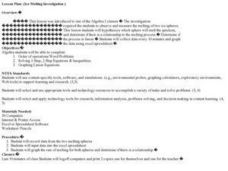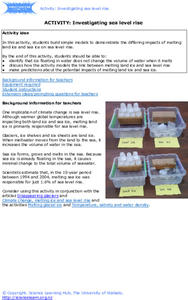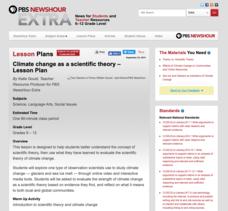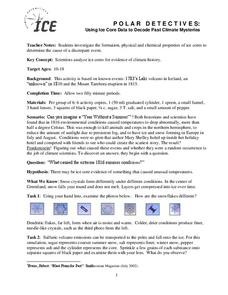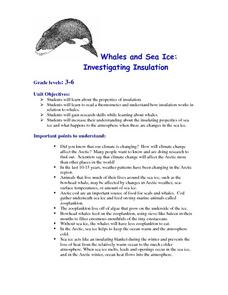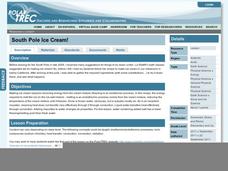Curated OER
Ice Melting Investigation
Students conduct an ice melting investigation in which they observe and measure the melting of two ice spheres. They develop a hypothesis as to which sphere will melt the fastest, collect data every ten minutes, and graph the data using...
Curated OER
Water and Ice
Students explore water and how it changes forms. In this investigative lesson students participate in an activity that shows them how water changes form and what it looks and feels like.
University of Waikato
Investigating Sea Level Rise
Find an explanation for the sea level rise. Pupils investigate the difference that melting land ice and sea ice have on the sea level. Groups create two models—one with ice on land and one with ice in the water. As the ice melts, teams...
American Chemical Society
Changing State: Melting
Dry ice is extremely cold — it is -109.3°F or -78.5°C. Scholars observe and explain the molecular motion associated with melting. Then they design their own experiments to speed up the melting process. Finally, a teacher presents a...
Curated OER
"I'm Melting!"
Third and fourth graders engage with a worksheet designed to help them differentiate between melting and dissolving. After reading an informative paragraph about the two actions, they consider four scenarios, and choose whether they...
Curated OER
Melting and Freezing Behavior
Students investigate melting and freezing behavior in substances. In this melting and freezing points lesson plan, students perform experiments to test the impact of various salts on the freezing point of water, they test the impact of...
University of Waikato
Melting Glacial Ice
There are many factors that affect how fast the glaciers are melting. A lab investigation has learners examine how the surrounding water affect the rate glaciers melt. They collect data from two samples of ice to determine how quickly...
Science 4 Inquiry
Investigating How Heat Flows
It is impossible to cool down a glass of water by adding ice. Young scientists explore heat transfer through videos, experiments, and interactive games. They quickly catch on that the water melts the ice and things aren't always as they...
California Academy of Science
Global Climate Change and Sea Level Rise
Ice is nice, and its condition on the planet has a significant effect. Junior geoscientists experiment with ice melting in both water and on land to discover how each affect the rising sea level. This detailed lesson outline even...
Curated OER
Changing Planet: Melting Glaciers
Resource links to a video, satellite images, data, and photographs of glaciers provide emerging earth scientists the opportunity to examine how the ice has been retreating over the years. A data table is included for pupils to record...
PBS
Climate Change as a Scientific Theory
Get your class thinking about climate change as a scientific theory. Guided by a handout, emerging earth scientists read articles and take notes about glaciers and sea ice. To conclude, they write an evaluation of the evidence for...
Curated OER
When Land Ice Melts
Students investigate what happens when land ice melts. They discuss how the melting of land ice is different than the melting of icebergs. Students observe what happens as the ice melts.
Curated OER
Water and Ice
Students observe and discuss what happens when water turns to ice and when ice turns into water. In this freezing and melting lesson plan, students observe ice and water and complete hands on activities that change their properties.
Polar Trec
Polar Detectives: Using Ice Core Data to Decode Past Climate Mysteries
How does examining an ice core tell us about weather? Learners set up and explore fake ice cores made of sugar, salt, and ash to represent historical snowfall and volcanic eruptions. From their setups, scholars determine what caused the...
Curated OER
Phase Changes of Water
A micro-unit on the phase changes of water includes three laboratory activities. Junior scientists compare the densities of ice and water, and then they do the same for cold and warm water. They examine freezing and boiling temperatures....
Curated OER
Ice
Students examine the different propereties of ice, such as freezing temperature. In this scientific lesson students complete several activities using ice, like making ice cream.
Curated OER
Whales and Sea Ice: Investigating Insulation
Young scholars investigate the properties of insulation as it relates to whales and sea ice. They research whales and examine the atmospheric changes that occur when there are changes in sea ice.
National Wildlife Federation
The Tide is High, but I’m Holding On… Using ICESat Data to Investigate Sea Level Rise
Based on the rate of melting observed from 2003-2007 in Greenland, it would take less than 10 minutes to fill the Dallas Cowboys' Stadium. The 17th lesson in a series of 21 has scholars use the ICESat data to understand the ice mass...
Polar Trec
South Pole Ice Cream!
How can you turn an ice cream activity into a scientific investigation? It's easy if you know ionic compounds, heat transfer, and the exothermic and endothermic process. Learners will explore the science behind freezing, insulation, and...
NOAA
Where Have All the Glaciers Gone?
What happens when ice melts? Well ... water happens. When that melting ice is a glacier, the amount of water that results produces change throughout the world. Middle school science sleuths uncover the truth about global warming, the...
Polar Trec
Sea Ice Impact
The arctic seas contain currents that are both warm (with high salinity) and cold (relatively fresh water) that circulate throughout the year. Through discussion, a lab, and a web quest, participants explore the impacts of melting and...
Teach Engineering
Insulation Materials Investigation
Don't melt away! Pairs investigate different insulation materials to determine which one is better than the others. Using a low-temp heat plate, the teams insulate an ice cube from the heat source with a variety of substances. They...
Curated OER
Baking Ice Cream
In this science and cooking worksheet, students investigate how it is possible to make a baked ice cream dessert. Students follow the detailed recipe, then answer the questions where they hypothesize why the ice cream did not melt.
Curated OER
Ice Breakers
Middle schoolers understand the effects of global warming on icecaps. They investigate the worldwide consequences that may result.


